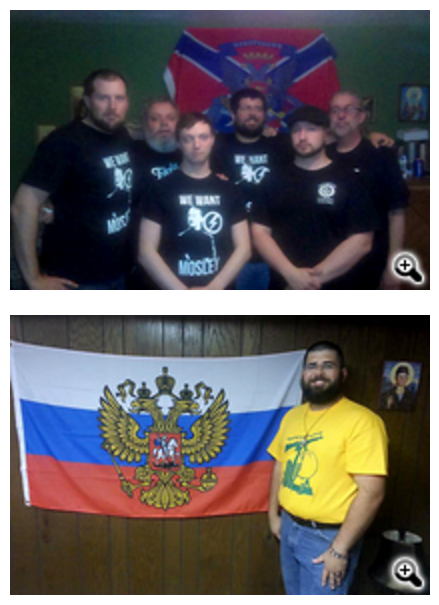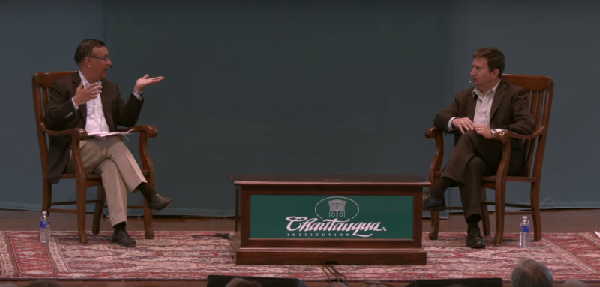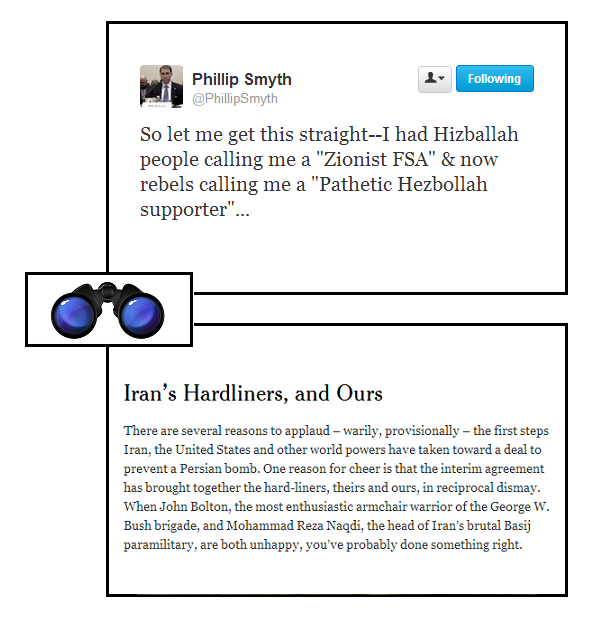Putin, Hezbollah on the Brit right, Pokémon Go at the Yasukuni
Saturday, July 23rd, 2016[ by Charles Cameron — a couple of discordant notes on goings on ]
.
This tweet from Casey Michel showing contemporary American fans of Sir Oswald Mosley —
My look at growing ties between US hard-right extremists and Kremlin-linked organizations: https://t.co/OtslMcDLMT pic.twitter.com/SOoPeMxvHf
— Casey Michel (@cjcmichel) July 17, 2016
— looked interesting, so I went to the linked Eurasia.net article, US Hate Group Forging Ties with the “Third Rome”, where I found these images:
— with a caption that reads:
In two photos posted to his personal social media networks, Matthew Heimbach stands with other white nationalists underneath the “Novorossiya” flag in a photo he published in May 2016 to his personal Twitter account (top) and he stands next to a flag used to represent the president of Russia in a photo he published to his personal page on the Russian social media web site VKontakte in August 2015. Heimbach, an American citizen, claims that Russian President Vladimir Putin is the best European leader of the 21st century. (Photos: Matthew Heimbach/VKontakte;Twitter)
**
The double-headed eagle flag in the second image, according to the Appleton Studios heraldry blog, is in fact the “achievement of arms of the Russian Federation: The red shield with St. George on horseback slaying the dragon, the shield on the breast of a double-headed eagle wearing crowns (with a third crown in chief) and holding in its talons the orb and scepter.”
That’s interesting, next to the Oswald Mosley guy — but what’s just as intriguing is ther symbolism of the t-shirt he’s wearing. That’s a Hezbollah t-shirt — and it’s no coincidence, as this next image from his twitter-stream shows:
May God protect the brave fighters of the S.A.A and Hezbollah in the struggle for Aleppo. #NationalistSolidarity pic.twitter.com/Duv4Ij92yG
— Matthew Heimbach (@MatthewHeimbach) February 9, 2016
**
Okay, that’s my first note. Here’s the lead-in to my second:
First China invents global warming now uses Pokemon against Japan, which doesn't us enough for me to care! Very bad! https://t.co/nfEB5N1ZBE
— J.M. Berger (@intelwire) July 23, 2016
**
Pokémon Go Is At The Center Of An International Incident
Wha??
What’s worth noting here is that the Pokemon GO “gym” (augmented reality contest location) that’s at the center of this kerfuffle is geolocated at the Yasukuni Shrine — which can be seen as the Japanese approximate equivalent of the Arlington National Cemetery in the US — the nation’s most sacred shrine to its war fallen — always bearing in mind this major difference, that the Yasukuni Shrine includes numerous convicted war criminals among those venerated:
Why is the Yasukuni Shrine so controversial?
The Shrine is a national religious institution in Japan. Since 1869 it has honored the souls of those who have died in the service of Japan. So it mostly contains military men, but also some classes of civilians who’ve died in war-time. These include merchant seamen, and workers in bombed munitions factories, but not people in the general population killed, say, by allied bombing in World War II.
In Shinto religion, the souls become ‘kami,’ or revered spirits. The word can be translated as ‘gods,’ but perhaps the word ‘saints’ is the most appropriate word in the western religious lexicon. So it’s a holy place for millions of Japanese who lost relatives fighting for their country.
Among the 2.4 million souls enshrined and revered in the Yasukuni Shrine are about 1,000 war criminals from World War II. These were men who were convicted and executed by Allied war tribunals, or who died in jail. This is one of the main problems for Japan’s neighbors; that reverence is being paid to those who committed some of history’s most egregious crimes. The shrine wasn’t an issue before they were inducted en masse in a secret ceremony in 1978, after a special new category of eligibility was created for the ‘victims’ of the international war crimes tribunals.
Those crimes were horrendous. The charge sheet at the tribunal included “murdering, maiming and ill-treating prisoners of war (and) civilian internees … forcing them to labor under inhumane conditions … plundering public and private property, wantonly destroying cities, towns and villages beyond any justification of military necessity; (perpetrating) mass murder, rape, pillage, brigandage, torture, and other barbaric cruelties upon the helpless civilian population of the over-run countries.”
That list hardly captures some of the individual horrors. For example, during the “Rape of Nanking” in 1937, two Japanese officers had a contest to see who could kill the most Chinese with their swords. Japanese newspapers covered it as though it was a sporting event, talking about the contest going into an “extra innings” when they both reached 100 at about the same time. Elsewhere, prisoners of war were used for bayonet practice, to toughen up new recruits in the Imperial Japanese Army; while other PoWs and Chinese civilians were staked out at scientific intervals to test the effectiveness of chemical and biological weapons. Chinese cities were deliberately infected with biological agents. Countless young Asian women were forced into sex-slavery to ‘entertain’ the troops.
The Yasukuni Shrine:







